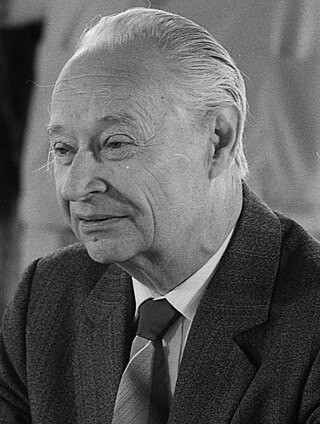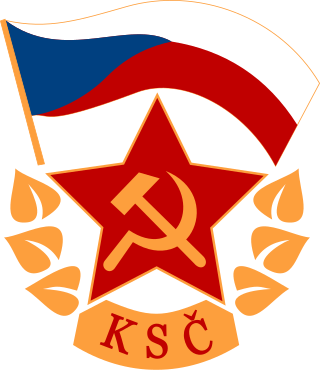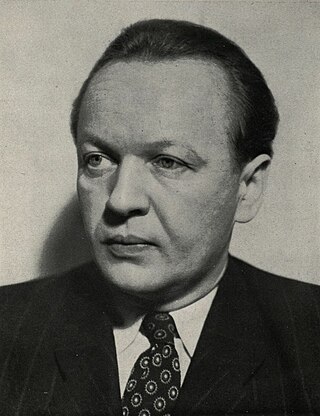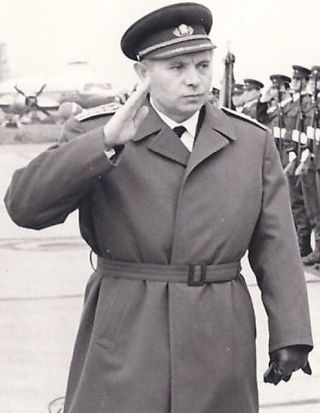
Klement Gottwald was a Czech communist politician, who was the leader of the Communist Party of Czechoslovakia from 1929 until his death in 1953 – titled as general secretary until 1945 and as chairman from 1945 to 1953. He was the first leader of Communist Czechoslovakia from 1948 to 1953.

The Prague Spring was a period of political liberalization and mass protest in the Czechoslovak Socialist Republic. It began on 5 January 1968, when reformist Alexander Dubček was elected First Secretary of the Communist Party of Czechoslovakia (KSČ), and continued until 21 August 1968, when the Soviet Union and three other Warsaw Pact members invaded the country to suppress the reforms.

Alexander Dubček was a Slovak statesman who served as the First Secretary of the Presidium of the Central Committee of the Communist Party of Czechoslovakia (KSČ) from January 1968 to April 1969 and as Chairman of the Federal Assembly from 1989 to 1992 following the Velvet Revolution. He oversaw significant reforms to the communist system during a period that became known as the Prague Spring, but his reforms were reversed and he was eventually sidelined following the Warsaw Pact invasion in August 1968.
From the Communist coup d'état in February 1948 to the Velvet Revolution in 1989, Czechoslovakia was ruled by the Communist Party of Czechoslovakia. The country belonged to the Eastern Bloc and was a member of the Warsaw Pact and of Comecon. During the era of Communist Party rule, thousands of Czechoslovaks faced political persecution for various offences, such as trying to emigrate across the Iron Curtain.

The Communist Party of Czechoslovakia was a communist and Marxist–Leninist political party in Czechoslovakia that existed between 1921 and 1992. It was a member of the Comintern. Between 1929 and 1953, it was led by Klement Gottwald. The KSČ was the sole governing party in the Czechoslovak Socialist Republic though it was a leading party along with the Slovak branch and four other legally permitted non-communist parties. After its election victory in 1946, it seized power in the 1948 Czechoslovak coup d'état and established a one-party state allied with the Soviet Union. Nationalization of virtually all private enterprises followed, and a command economy was implemented.
Although political control of Communist Czechoslovakia was largely monopolized by the authoritarian Communist Party of Czechoslovakia (KSČ), the party technically shared political power with other parties of the National Front. The leader of the KSČ was de facto the most powerful person in the country during this period. Czechoslovakia's foreign policy was openly influenced by the foreign policy of the Soviet Union.
With the collapse of the Austria-Hungary at the end of World War I, the independent country of Czechoslovakia was formed as a result of the critical intervention of U.S. President Woodrow Wilson, among others.

Gustáv Husák was a Czechoslovak politician who served as the long-time First Secretary of the Communist Party of Czechoslovakia from 1969 to 1987 and the President of Czechoslovakia from 1975 to 1989.

Antonín Zápotocký was a Czech communist politician and statesman in Czechoslovakia. He served as the Prime Minister of Czechoslovakia from 1948 to 1953, and then as President of Czechoslovakia from 1953 to 1957.

Antonín Josef Novotný was a Czechoslovak politician who served as the President of Czechoslovakia from 1957 to 1968, and as First Secretary of the Communist Party of Czechoslovakia from 1953 to 1968. An ardent hardliner, Novotný was forced to yield the reins of power to Alexander Dubček during the short-lived reform movement of 1968.

Ludvík Svoboda was a Czech general and politician. He fought in both World Wars, for which he was regarded as a national hero, and he later served as the president of Czechoslovakia from 1968 to 1975.

The Czechoslovak Socialist Republic, known from 1948 to 1960 as the Czechoslovak Republic, Fourth Czechoslovak Republic, or simply Czechoslovakia, was the Czechoslovak state from 1948 until 1989, when the country was under communist rule, and was regarded as a satellite state in the Soviet sphere of interest.

General Alexej Čepička was a Czechoslovak communist politician. He held several ministerial positions in Czechoslovakia after World War II, including Minister of Justice from 1948 to 1950 and Minister of National Defence from 1950 to 1956.
Jan Beneš was a Czech writer, translator, publicist and screenwriter. He was also using the pseudonyms Milan Štěpka, Bobisud Mihule, Mojmír Čada, Ing. Čada, JAB, JeBe, Světlana and others. He is an author of many novels and several historical books. He was a political prisoner of the Czechoslovak communist regime, and a Green Beret volunteer. In 1969 Beneš emigrated to United States, after the Warsaw Pact invasion of Czechoslovakia. He served 20 years at the US Department of Defense. He returned to Czech Republic in 1992 after the change of regime.

On 20–21 August 1968, the Czechoslovak Socialist Republic was jointly invaded by four fellow Warsaw Pact countries: the Soviet Union, the Polish People's Republic, the People's Republic of Bulgaria, and the Hungarian People's Republic. The invasion stopped Alexander Dubček's Prague Spring liberalisation reforms and strengthened the authoritarian wing of the Communist Party of Czechoslovakia (KSČ).

Čestmír Císař was a Czech and Czechoslovak politician and diplomat. He served as the first Chairman of the Czech National Council from 1968 to 1969 when the Czech Republic was part of Czechoslovakia during the Communist era. A leading advocate for reforms of the Communist Party, Císař introduced a series of liberal reforms to Communist Czechoslovakia, becoming a major figure in the Prague Spring as a result. He sought to create a new form of socialism with a "human face." His reforms were repealed following the 1968 Warsaw Pact invasion of Czechoslovakia. He was removed from office and expelled from the Communist Party until the Velvet Revolution of 1989.

Martin Dzúr was a Slovak military officer and a communist politician, who served as defense minister from 1968 to 1985.

Otakar Hromádko was a Czechoslovak journalist and army officer. Although he spent first half of his life fighting for communist ideals later became a victim of communist purges and a political émigré.

Relations between Czechoslovakia and the United States refer to two periods in Czechoslovakia's history. The first being the establishment of Czechoslovakia after its declaration of independence in 1918 from Austria-Hungary initiated by President Woodrow Wilson as part of his Fourteen Points following World War I. The second period being the communist era from 1948 when relations were strained, until 1992 when Czechoslovakia split forming the independent nations of the Czech Republic and Slovakia as a result of the 1989 Velvet Revolution.
Czechoslovak Military Mission in Korea (1952–1956) included a military hospital operating in the Korean War on the side of North Korea.














